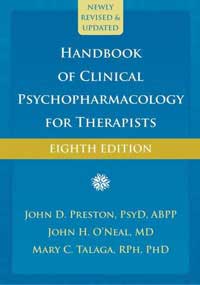 376 pages
376 pages12 CE credits
Course Enrollment
$240.00
Add to Cart
All exams are taken online. The exam for this course will be available in "My Courses" immediately upon enrollment. Note the book is not included.
The book is available for purchase from Amazon.
As an Amazon Associate we receive a rebate from qualifying purchases.
HANDBOOK OF CLINICAL PSYCHOPHARMACOLOGY FOR THERAPISTS, 8th Edition
John D. Preston, Psy.D., John H. O'Neal, M.D., & Mary C. Talaga, R.Ph., Ph.D.New Harbinger Publications, 2017
DESCRIPTION
The Handbook of Clinical Psychopharmacology for Therapists is the go-to resource for mental health clinicians looking for clear, reliable information about the treatment of mental health issues. Organized by disorder and, within each disorder, by medication, this book is designed to familiarize clinicians and students with the basic terminology and models of pharmacokinetics.
This fully revised and updated eighth edition provides essential information on new medications and treatment options and includes the latest research on side effects, contraindications, and efficacy of all major medications prescribed for mental health disorders. The book also features an important new chapter on the effects of withdrawing from psychopharmacological medications.
This handbook makes it simple to: get the facts about drug interactions and side effects; find out how medications affect adults, children, and adolescents differently; learn how different cultures view medical treatment, vital information for anyone who treats clients from a variety of backgrounds; and discontinue medication safely when needed.
This essential guide to psychopharmacology has been adopted as a textbook at universities nationwide and is an important resource for every therapist's library.
The reader will be able to:
• Describe the neurobiology, pharmacology, medications, and pharmacological treatment of the major psychiatric clinical syndromes
• Access authoritative information on the indications, contraindication, efficacy, side effects, and success indicators for each drug
• Discover and apply new ways to consult with clients and colleagues from an informed perspective
• Name 4 common ways that psychiatric disorders can influence one another and can cause complexities with diagnoses
• Describe the drug interaction in which one of the two drugs is preferentially and completely metabolized
• Discuss the three major problems preventing the development of the ideal psychiatric drug
• Compile a list of some concerns about medication treatment for children
• Explain in plain language to patients what may cause the re-emergence of their symptoms after they have responded well to psychotropic medication treatment
• Use Patient Information Sheets and other resources in the book for each of your clients
AUTHOR
John Preston, Psy.D., ABPP, is professor emeritus at Alliant International University in Sacramento, CA, and has served on the faculty of the University of California at Davis School of Medicine.
Mary C. Talaga, R.Ph., Ph.D., is administrative services leader for Kaiser Permanente Pharmacy Operations, Northern California Region. She has been a pharmacist for 27 years with specialization in psychiatric pharmacy.
John H. O'Neal, M.D., is a board-certified psychiatrist at Kaiser Sacramento Medical Center and assistant clinical professor in the department of psychiatry at the University of California, Davis, School of Medicine.
"One of the best educational works on ethics I have encountered."
-Christopher H. Adams, Psy.D
"Therapists will find this wonderful book helpful in two ways–as both a textbook and a reference book. Read as a textbook, they will learn essentially all they need to know about why patients are taking the meds they are taking, and what the likely next steps in treatment will be. As a reference book, therapists can look up a patient's medication or diagnosis and quickly review dosing, side effects, and rationale for use. As a seasoned psychopharmacologist, I found the information accurate, useful, and presented with a refreshing clarity. It's rare to find a book with so much information that is also a pleasure to read. I recommend it highly to any mental clinician, whether they are a therapist, a prescriber, or both."
--Daniel Carlat, MD, editor-in-chief of The Carlat Psychiatry Report
"I'm a psychoanalyst and clinical psychologist with no medical training, and I found Handbook of Clinical Psychopharmacology for Therapists to be a compelling and stimulating read, as well as a welcome addition to my reference shelf. This text is coherent and user-friendly, and reading it is a surprisingly pleasurable way to expand your knowledge in an area of clinical treatment usually not made this accessible to nonmedical professionals."
--Susan Flynn, PhD
"If you have only one reference book on your shelf addressing the interface between clinical treatment and psychopharmacology, this should be it."
--Marvin B. Berman, PhD
"Handbook of Clinical Psychopharmacology for Therapists is a modern masterpiece written by a multidisciplinary team of distinguished practitioners. It is one of the most clearly written and reader-friendly yet comprehensive books on the subject of psychiatric diagnosis and psychotropic drug therapy. The book is packed full of useful tables, figures, and illustrations that amplify the main text, or can be used independently for a rapid introduction to the field or for reviewing the fundamentals. Covering both the spectrums of pathophysiology and the neurobiology of drug action, this slim and state-of-the-art-and-science text is truly a handbook worthy of the name, and should be an essential resource for mental health professionals and students alike."
--Clifford N. Lazarus, PhD, licensed psychologist and director of Comprehensive Psychological Services in Princeton, NJ, and coauthor of Don't Believe It for a Minute and The 60-Second Shrink
"Handbook of Clinical Psychopharmacology for Therapists is a wonderfully useful and comprehensive book. It should be essential reading for all mental health professionals and for others like myself who have family members suffering from mental illness. Its great virtues are its clarity and its humane and informed sense of the diagnosis, treatment, and care of extraordinarily complicated conditions."
--Jay Neugeboren, author of Imagining Robert
ISHK CE at Home
1702-L Meridian Ave., #266
San Jose, CA 95125-5586
This website uses cookies to ensure you get the best experience on our website. Learn more
